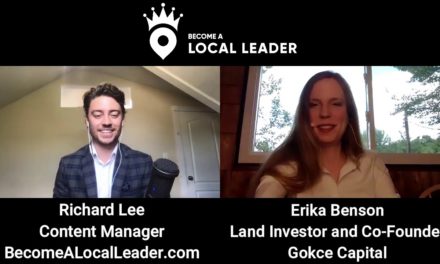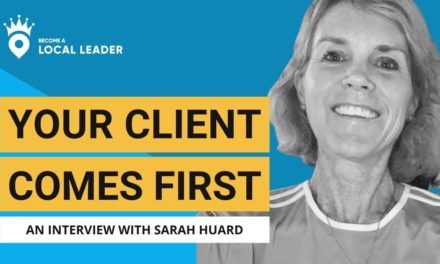Jim Crawford is a Local LeaderⓇ and real estate expert in the Pottstown, Pennsylvania area. He is also one of the authors of the new real estate business book becoming a local leader. This book features 22 Top Producing agents. They share their strategies through their stories on how to build one’s business through relationships and referrals.
One of the themes that we will see over and over again, and definitely in Jim’s chapter, is around the mindset of a Local LeaderⓇ and an agent who builds their business on relationships and referrals, the attitude of giving value and being of service and focusing on that instead of finding buyers and sellers and making money.
For anyone who’s got a military background, I think you’ll resonate with Jim’s story so we’ll get into a little bit about that and really just how he has built his business through relationships and referrals, as well as some of his best practices.
The first question I always ask everyone is their main message. The 22 of you who wrote this book together had a goal to share wisdom and advice to other agents to help them with their career. You had your main message you wanted to share. So, how would you summarize some of the advice you want to give to agents?
I think from a 10,000-foot level, it’s twofold. Managing or working towards relationships over transactions, which everyone seems to have that word and use that word “relationships”, but really getting after it and accomplishing building those relationships, not just talking about building relationships.
I think the second part that kind of goes with it is managing your work appropriately behind the scenes where I’ve been told in the past, “Plan your work and work your plan”. If you put both of those things together, some discipline with actually putting the work in, and then making that building meaningful relationships. I think that’s a simple way to say you’ll be successful for sure.
Let’s dive into those things. Let’s talk about walking the walk, not just talking the talk around relationships over transactions. What would be a sign to an agent who says that they value relationships, but their actions don’t show it?
I think the first thing that makes me think of it is if you’re the client or customer and you ring their phone right now, will they answer? I think sometimes access is the simplest way to kind of prove yourself. We all have things going on day to day and don’t want to answer the phone sometimes because we’re busy doing something else. However, if it really is about building those relationships, it matters to have the conversations when they present themselves.
Everyone also talks about “people work with who they like and trust”. And so, I think part of the relationship building, there’s an intangible there that if you’re doing it sincerely, the other side of the relationship feels that you’re being sincere. And so, it’s not something that you can actually turn on or turn off. If you’re being sincere, it will come off that way and those relationships will flourish.
Please give people a backstory to kind of who you are and how you got into real estate. And maybe touch upon why you’ve been able to build your business on relationships, and focus on relationships and focus on being of service, whereas maybe other people’s struggle to.
I did some time in the US Navy. I was stationed over in Japan. I did a few Gulf cruises in my time. Interestingly enough, I was a radio man. And when I got out of the military, that didn’t really translate into anything in the real world. We were still using teletypes at the time. Technologically, we were a little bit behind the civilian world.
I sort of ended up in sales by accident. Although I found out that I loved it and I was good at it. I’ve worked and led teams in a variety of different industries. Most recently, the veterinary industry. The thing that I didn’t like about it was the travel. I ended up on the road three weeks out of four in most cases. I have two young children at home. And so, it was just an opportunity to spend some more time with the kids and also be able to do something locally, rather than a territory of North America.
I jumped headfirst into real estate. I had a friend that had done the same thing, a similar path before I did. And so, we had a pretty good conversation about what it looked like so that I understood the expectations and sort of what was needed to be successful. And I’m glad that I did. Things have worked out well. You talked about folks getting concerned with the next dollar. And it just made me think upon a quote that success is dependent upon effort. And so, I think in a lot of cases in the real estate industry, it seems that folks get their licence, they get some business cards, and they put a few posts on social media, and they expect that they’re going to get phone calls and people are going to buy properties with them.
Unfortunately, it doesn’t work out that way. Sometimes, even some of the closest people to you won’t dial your phone for a variety of reasons. And so, you have to put the effort in to meet as many people as you can. Not just meet them but be a value to them to build that relationship. It’s the old adage of “givers get”. If you give of yourself, it will come back. I think that’s one of the reasons that it worked out perfectly with me personally and Parkbench because the model fit perfectly. It gave me a platform by which to go help local businesses and organizations. And in return, build relationships, which ultimately helps me as well.
There are a lot of people that get into real estate from a sales background. I’m sure when you got into real estate, you’re like, “Well, this is different.” Maybe you can highlight some of the differences between doing sales for a company and doing sales in real estate?
I think one of the biggest differences is, if I have a product to sell, the uncovering needs portion of things, the discovery portion of things is the same if I have a pen to sell, or in real estate, understanding needs for someone’s real estate goals and needs. The difference is that, I could be the best salesperson in the whole wide world, if the client doesn’t love the house, I’m not going to sell it to them. It wouldn’t make sense for me to do so anyway.
And so, I think, a good salesperson has learned over the years that you must build rapport, you must do your discovery properly. And one of my favorite quotes, “prescription before diagnosis is malpractice”. So, it works in regular sales, so to speak, and also in real estate in that I couldn’t tell you how many times I ended up with a client that was working with someone else, and they just didn’t feel heard. Their email was full of properties that made no sense for them for a variety of reasons. It only took a 15-minute conversation with pointed questions to understand what their needs were, and then deliver the right properties that fit those needs. And so, there are a lot of parallels but I think real estate is far more on the relationship and discovery ends with a whole lot of marketing involved as well.
There are these technologies to help agents send properties to people to help them start understanding what’s on the market and how much and what does it look like and stuff like that. What are your thoughts on how technologies that you found really helpful and the information you need to gather from the person to make sure that when you do send properties, you’re sending stuff that people are like, “Yeah, okay. Okay, we’re in the ballpark here.”
My first thought to that question is something I heard years ago from a CRM perspective, customer relationship management tool. It’s, “garbage in, garbage out”. And so, the parallel there is an agent that doesn’t do the proper uncovering of needs, quotes bad info in. And so, technology can only give you what you’ve asked for. And so, it really is about, you know, in our MLS, and I would assume the most of them out there in the world are very similar. You can get pretty darn specific on properties. You need to understand what your customer wants and where the boundaries are, and then set the right expectations. I’m going to set this search up for you. And here’s the parameters I’m going to use based on our discussion. If you’re finding that these aren’t right, tell me right away, because we can tweak the criteria to make it work better. And so, now the expectation has been set that if they’re unhappy with what they’re seeing in their inbox, all they have to do is call or text or email me and we’ll fix it, versus the agents that will set it and forget it. It’s not a George Foreman Grill. You can’t just fire some vague criteria in and then wait for them to say, “Oh, I love this property.” You can but you will lose more often than you’ll win.
One of the things you talked about earlier that I want to get back to is the focus on relationships over transactions. That’s one piece. The second part was “plan your work, work your plan” or I’ve heard it as “make a plan and work that plan”. I think there’s two parts to that that one of two agents either struggle with the planning or they struggle with the execution, the discipline of the plan. Have you experienced that? Either not doing the planning or having trouble with the planning. And then, what helps you actually be good at the planning for your outcome or your goals that you want. And then, with the execution of it, what’s helped you actually execute and be on track or stay on track or get back on track versus not?
Sure. When I got into real estate, you don’t know what you don’t know, from a new industry perspective. And so, the great thing is there’s a product called Google that you can go on and find all sorts of resources for what that plan should look like, a template to work from. So, I went out there and looked and found some that made sense. And so, I took pieces from one and pieces from another and created one to get me started. And then as I learned more in the industry, that changed and evolved. And so, from a planning perspective there are a ton of resources out there to find. You just have to find the one that works best for your mindset and the way you do business.
The execution part of things, that’s never really been a major issue for me. Simply, I guess from the military background, you get your marching orders and you do them. We talked about relationships. I am financially driven. There’s no doubt about it. I mean, I’ve got two small kids and a mortgage like everyone else. And so, there is a financial aspect to the business. And so, if ever I feel like I’m going awry, I just look to see if I have made what I anticipated to do and what my goals were for the year. And if not, I need to do more. Sometimes that might be more hours. It sometimes might be a different activity. It sort of just depends. But really, when it comes down to it, if you want to be successful be a value and work hard. I mean, that’s really what it comes down to.
I’m a big quote guy. I love quotes. Ben Franklin has one of my favorites ever. And that’s, “Energy and persistence conquer all things”. If you put the efforts in, the results will come. The better you are at those efforts, the better the results. But that comes with time as well.
Speaking to the military crowd, people who are now in real estate from the military or people in the military who are thinking about making a transition into real estate, you say like you get your orders and then you go do it. Now, when you’re your own boss you’re not given orders unless from your higher self or your future self on how people think about it. So, speaking of that, what was the transition like into business ownership? What advice would you have for people who are used to a structured environment with someone to listen to, to guide them, to tell them what to do, to them now making the transition to owning their own business?
You certainly learn in the military that you’re given an order and you follow that order without question. However, my brain is wired in that my goals are now my commanding officer. The goals are what drives me to start when I start and end when I end and accomplish what needs to be accomplished. Not everyone is wired that way. That’s for sure. And so, my recommendation would be if you’re not wired that way, join the right brokerage where you have someone that will hold you accountable, that will do that for you. And there are folks that will do that, if you ask them to. They’ll only keep doing it as long as you follow through because that’s more work on their plate. Find a coach or an accountability partner if that’s the motivation that you need to get that done. There are avenues to do so out there.
I really like that. I’m a big journaling person. You write down your goals for the day, you write down your action plan, and then you just go do it. And sometimes the plan is something tangible or metric driven, like, make this many calls, send as many emails, get these tasks done. But sometimes it’s also intangible like, be this way, show up this way, bring this energy, be persistent. That’s the goal. That says, “Hey, your commanding officers. Toughen up. Let’s go. Stick through this.” And like, “All right. Okay. I’m going to go do that.” Knowing that challenges will come my way that day. I think it’s really good advice for people to write down your goals and treat them as your commands from some higher purpose.
I’m just thinking one more thing along those lines. I think a lot of folks over the last 12 months with the pandemic have been working from home and have now got a taste of what that feels like. And so, I know a lot of people that the first time they get to work from home, it’s really easy to not get out of bed until you feel like it when no one’s actually there looking. I think you have to set in your own mind that I’m going to do it because it’s the right thing to do and it’s what needs to be done. I don’t know that I could look my children in the face if I hadn’t given it my all that day.
It’s very true. And one of the things you talked about in your chapter was time blocking. How do you do it? What are some of your best practices for effective time blocking?
There’s always going to be an exception to the rule. And so, I have a daily routine that I try to follow. It doesn’t always work out for a variety of different reasons. Some work related and some home life related. I think, in my mind, if I’ve missed something on a particular day, I know that I still owe it to myself. And so, I need to get it back in on another day and maybe double up that activity or make an extra call, whatever the case may be. That sort of commitment to myself of what’s going to be accomplished.
The other piece of that puzzle is, I think, again, when you’re working with your clients, it’s setting proper expectations. If they call and you schedule your showings an hour after they call every time, they’ve now trained you that they can call and get a showing in an hour. Versus, if you set the expectation upfront. “Listen, I’m going to give you as much time as you need. However, I have things that I have to accomplish as well. And so, here’s some parameters where if we want to do showings on a Wednesday morning, we need to talk about him at least 24 hours in advance.” Now, again, there’s exceptions to every rule. Homes pop up and you know it’s going to be really busy and probably going to have an offer within 24 hours, we’re going to figure out a way to get it scheduled. But if you allow everything outside to take control of your schedule, you’ll never accomplish what you need to accomplish. You have to have a balance, for sure.
Now, one of the things you talked about in your book is the activity that you do to grow the business, which I’ve heard this term before and I feel like some people may have heard it but they may not totally understand what it is – circle prospecting. What is circle prospecting to you? How do you do it? What do you say? Who are you calling? How often are you doing it? Give people a glimpse of how you execute.
It’s pretty straightforward. Circle prospecting is calling into a neighborhood that maybe you just sold a property or that someone else just sold a property. The goal is just to, again, build some level of relationship with the homeowner. And for me, it’s as simple as, “I’m me. How are you? How are things today? How are you doing? Did you know that X property just went under contract or just got listed?” That starts a little bit of a conversation. Is there anything in the world that I could ever do to help you?
If their answer is yes, “Great. What is it?” If it’s no, “Do you have an agent that you’d work with if you did have real estate needs?” Again, If that’s yes, “Great. Have a nice day. Appreciate your time.” And if it’s no, “Can I keep in touch with you so that I could be your resource going forward?” And then, they would get moved to my weekly email list and off we go. You’d be surprised how many conversations you get into with perfect strangers because you called and asked, “Is there anything I can do to help you?”
What are some of the things they say, that gives you a sign of “this is a good conversation, keep going”?
On the phone, there are sounds that happen, that aren’t actually sounds. Sometimes it’s silent. Sometimes it’s a giggle. Sometimes it’s just tone. And so, it is a learned technique, for sure. But you can get a pretty quick feeling if they’re willing to have a conversation with you or if they’ve had enough. And in which case, it’s much like we talked about before. Sometimes that no is okay because we get to move on and maybe get a yes on the next one. And so, it’s a simple way that I’ve found to reach a whole lot of folks in a short amount of time. Again, begin to build those relationships. I mean it as well. If there’s anything I could ever do for you. If they said, “I could use some new mulch in my yard.” I might tell them, “All right. If you pick it up, I’ll stop by Saturday and help you spread it.” Why not? That’s giving to hopefully get in the future. Right? No one’s taking me up on that yet. But, I would do it.
Well, it’s a chance for you to potentially refer business. You may not actually provide the product or service they need help with but then if you refer to the person who can do it, then what’s that person going to want to do in reciprocation to your referral? I think, again, intellectually we know. “Hey, if I can give referrals to people, I’ll probably get more referrals.” But then it’s like, “Well, how do I give referrals?” That’s like the next question. How do I give it? And it’s just by asking these questions of, “Hey, what do you need? What do you need help with? What are your goals? What are your challenges?” Then, you get the information that either you can help with or you can then refer to?
It’s interesting. I’m in the beginning stages of forming one of those types of groups locally. Not that particular brand but very similar. One of the things that I talked about with some of the leadership there is, from the real estate perspective, it’s easy to share those names because we are dealing with someone that is buying a home. There’s a lot of things that go into that home process, and then, four years after owning the home. And so, in one of those networking groups, if you can join the right one and meet the right folks, you can build a book that you can share with your homeowners to say, “I meet with these folks regularly. I recommend every single one of them. I know them all. This is for you now. This is a little something so that if something were to come up, now you’ve got a resource and don’t have to rely on Yelp, Google or Angie’s List, or whatever the case may be.”
What would be your selling feature as to why a younger agent should pick up this book?
That’s a great question. I guess, the first thing would be the volume of folk involved. You’re going to get a lot of different perspectives on the same industry. You mentioned a lot of those types of books that are out there. I’ve read a ton of those over the years. They all have their own point of view. And sometimes you begin to read one and it doesn’t fit your style or what feels right to you. And so, I think, a book like this, you get the opportunity to read a whole bunch of different versions of the same goal of being successful, hopefully. I can’t imagine that you wouldn’t find one or more of those stories that could help point you in the right direction.
If people want to connect with you, if people like your story, if they resonate with the stuff that you talked about and who you are as a person, how can people get in touch with you?



